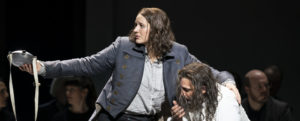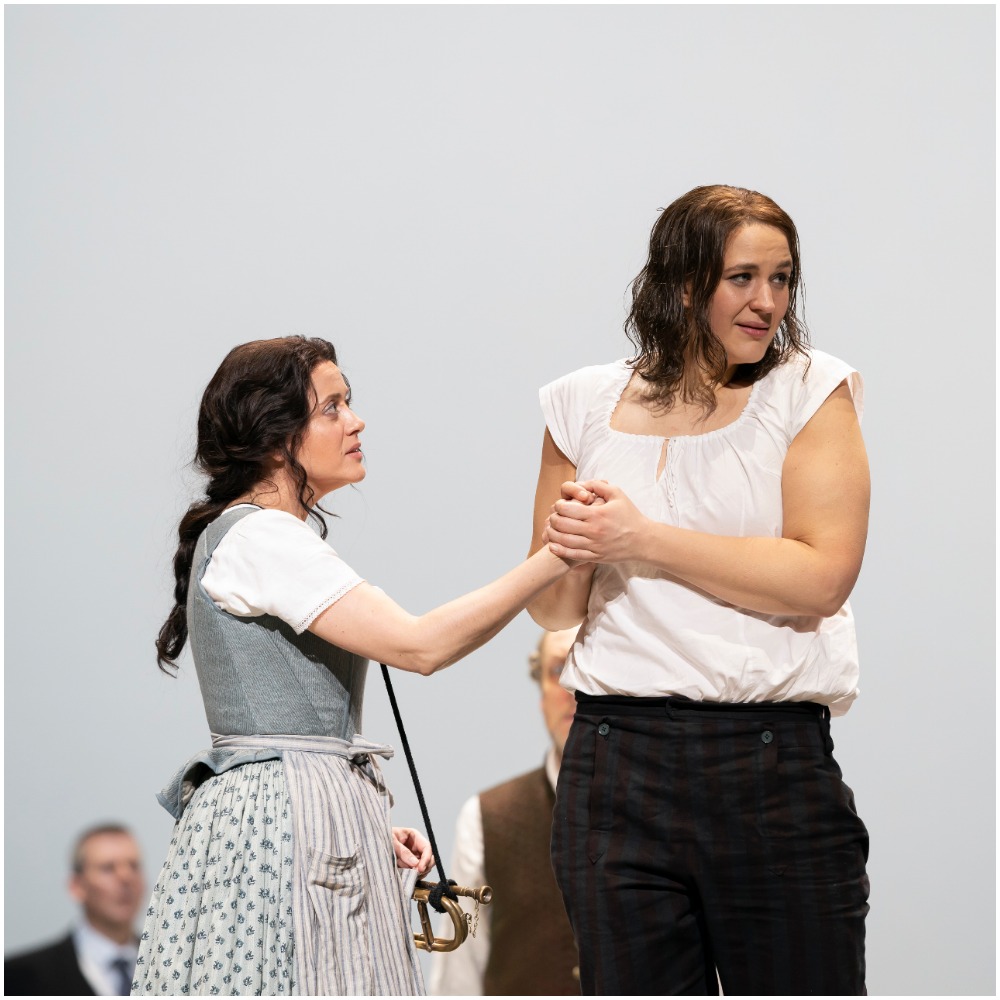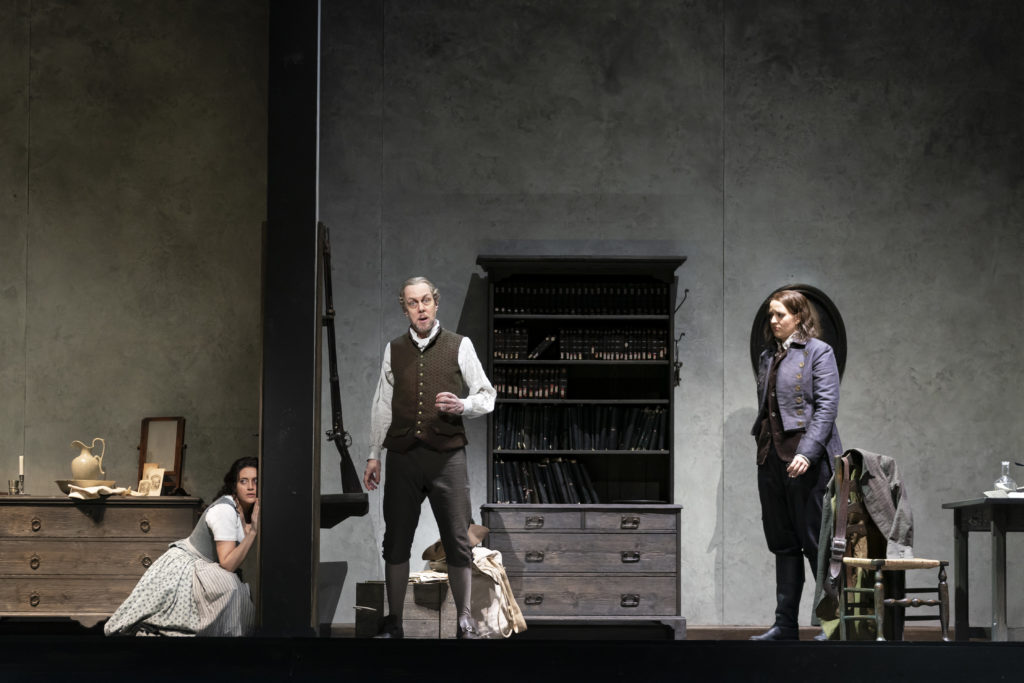
Royal Opera House 2019-20 Review: Fidelio
Monumental Lise Davidsen Dominates Controversial Production Starring Sick But Solid Jonas Kaufmann
By Benjamin Poore(Credit: Bill Cooper)
Anticipation was already at fever pitch for this new production of “Fidelio” in London, even before Oliver Mears, Royal Opera Artistic Director, appeared on stage before curtain up, evidently the bearer of bad news.
“Please don’t be alarmed,” he reassured: Tenor Jonas Kaufmann only had a cold, would indeed sing, and asked for our indulgence. “We’ve been indulging him for years,” someone was overheard to mutter.Tempers had already flared in the press about this superstar staging of Beethoven’s only opera, with well-heeled members snapping up most of the tickets before public sale.
This is the ROH’s first new production of “Fidelio” for over a decade. So too does it welcome rising star Lise Davidsen and the controversial German director Tobias Kratzer in a house debut.
Caught Between Genres
“Fidelio” is a troublesome work, seemingly caught between genres, one conventional and the other idiosyncratically Beethoven’s. Its first act continues the tradition of Mozart’s bourgeois Singspiel like “Die Zauberflöte” and “Die Entführung aus dem Serail,” as well as the domestic melodrama of Schiller. The second is sweepingly symphonic and philosophical, forming a musical and vocal essay on the nature of human freedom.
This disjuncture Kratzer makes into a virtue and tackles headlong, using it to explore the political aspects of spectatorship.
The production contrasts theatrical styles with each act. The first half is set during the Jacobin Terror, resolutely naturalist and realist, complete the trappings of traditional operatic spectacle: sumptuous period costumes and Don Pizarro riding in on a magnificent black stallion. There are hints, of course, that this is not the whole dramaturgical story: the bright white light that framed the action glared so as to disturb total absorption in the stage picture; so too the live video of the audience getting settled in the stalls with “liberté, égalité, fraternité” superimposed.
The second half’s Brechtian approach turns these words into a moral and ethical challenge for the audience. Florestan is chained to a rock – like the Prometheus Beethoven would summon in his 1803 ballet, and who was such a potent symbol for the dynamic radicalism of the Napoleonic era – in a bourgeois drawing room around which the chorus sit as spectators. Their dress suggests both mourning and theatre-going, mirroring the ROH audience. Live video provides close ups as they watch Florestan’s torments, some recoiling in disgust, some moved to offer the thirsting prisoner water from their bottles. Kratzer’s two visions of “Fidelio” are held up against each other, the second ironizing the first, to examine what production styles and directorial approaches mean for audiences.
It’s awkward and peculiar, which is the point: faces are seen up much closer than usual; audience reactions that are normally shrouded in protective darkness are given painful theatrical scrutiny. Kratzer gives us a story about what it means to be a bystander or a collaborator to terrible events (What, indeed, are Marzelline and Rocco, in the original scenario, but morally tarnished functionaries in an oppressive regime?). Text from Georg Büchner’s “Dantons Tod” heightens the political stakes of the first half, presenting Don Pizarro as revolutionary fanatic; lines from Franz Grillparzer about Beethoven himself are appropriated by Marzellina in the second act to give the work existential density.

Credit: Bill Cooper
Revisionist Journey
Marzelline’s own journey is a key innovation in this interventionist staging from Kratzer and dramaturg Bettina Bartz, here sung by Amanda Forsythe with a combination of flexible steel and light-footedness.
In Act one she discovers Leonore’s subterfuge, and is crushed by the disappointment, cradling the songbird – surely an allusion to contemporaneous prophet of freedom William Blake – killed earlier by Don Pizarro as the prisoners sing “O Welche Lust.”
But in Act two it is this disillusionment that animates her into action: she blows the trumpet, announcing the redemptive arrival of the minister, and wounds Don Pizarro with a pistol. It is Marzelline’s actions that rouse the onstage audience to batter Pizarro’s guards and take back control, finally stepping across the glowing threshold of the stage to assert their freedom.
Jonas Kaufmann is one of the great Florestans of the world and, notwithstanding some cloudiness, he delivered with customary artistry, though one did struggle to pick him out in act two’s ensembles.
Next to Davidsen the relative modesty of his voice was quite apparent. But there were plenty of show-stopping moments, not least the astonishing “Gott” that opens Act two: beginning with singing of imperceptible softness, like a moan of sadness, growing to an extraordinary roar of anguish.
Kaufmann’s face may be on the posters, but it is unquestionably Lise Davidsen’s show. The clue is indeed in the title, after all. Her physical presence itself is so commanding, towering over everyone else on stage, it is little wonder she sweeps all before her. Rarely has the determined power of Leonora’s will sounded so immediate.
Her soprano is volcanic in its power, molten in its heat and energy, though its force is never bludgeoning nor metallic. Her technique is such that changes in registration are imperceptible and her legato a great tumultuous wave; the timbres she produces luminesce and enfold, whether singing softly or at full pelt.
It’s first-class singing that makes Beethoven’s unyielding vocal writing sound easy, with Davidsen almost laughing off the high notes of her joyous Act one “Noch Heute.” Her Act three “O Gott, Welch ein Augenblick” was radiant but tender, her music-making above the stave a silver gleam. Comparisons with Birgit Nilsson scarcely seem hyperbolic for this phenomenal talent.

(Credit: Bill Cooper)
Lower Voices
Georg Zeppenfeld made an all-too-rare return to this house as Rocco. As a Wagnerian bass his voice has gathered into itself gravitas and sagacity, and a granite weight well-suited to the metaphysical and heft of all that serious Teutonic stuff. For this reason his turn as a petit bourgeois functionary in Act one, singing to Leonora about getting your finances together, felt a little peculiar.
But he undoubtedly had a special glow in a ravishing “Mir ist so wunderbar” quartet, a tender moment of reflective joy for the character suggestive of a much more complex psychology than some productions might admit. In the second half the emotional seriousness that suits his performance felt much more natural, with a noble paean to Leonora’s apparent kindness to the condemned man.
Antagonist Don Pizarro was sung by Simon Neal, who was evidently having some vocal difficulties (he withdrew, it turns out, from the subsequent performance). Whilst he certainly relished the villainy and acted convincingly enough his baritone was coarse and struggled to navigate his top notes without shouting in “Ha! Welch in Augenblick,” resulting in something rather brutish and colorless.
Robin Tritschler’s Jaquino sang this rather knockabout character with a degree of tenderness and vulnerability that tinged his rejection at the hands of Marzelline and bullying from his peers with surprising pathos.
Latvian baritone Egils Silinš felt like luxurious casting indeed for his brief appearance as Don Fernando.
Antonio Pappano in the pit offered up a focused, concentrated sound throughout, marrying his lyrical bel canto wisdom with a lithe muscularity, particularly from the strings.
Pappano infused many moments of the score with darkly Wagnerian inwardness, the moody opening of Act two proving a special highlight in summoning the dark melancholy of “The Flying Dutchman” or “Lohengrin.”
The Royal Opera Chorus were perhaps the only thing louder and more monumental than Lise Davidsen that afternoon. They proved they could sing beautifully in a searching, fragile “O welche Lust” but went – quite rightly – hell for leather in the thrilling final moments of Act two. You don’t always want subtle.
Kratzer’s a disjointed production clearly didn’t sit well with an audience whose expectations about superstar productions didn’t extend to virtuosic dramaturgy, and the production team was met with boos. But as a confrontational and dynamic piece of theatre, with concentrated thematic consistency, it can hardly be faulted.


